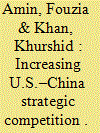| Srl | Item |
| 1 |
ID:
133522


|
|
|
|
|
| Publication |
2014.
|
| Summary/Abstract |
The paper seeks to assess the growing strategic importance of the Bay of Bengal and how this signifies for Bangladesh's imperative to develop strong maritime capabilities. With the growing significance of the Bay of Bengal, both the littoral and the extra-littoral countries are reassessing their interests in this region and reformulating respective strategies to ensure optimum benefit in their favour. After the verdict by the International Tribunal for the Law of the Sea (ITLOS) in March 2012, Bangladesh is now able to establish its claim over a significant area in the Bay of Bengal. These emerging realities are driving Bangladesh to develop capabilities to project effective control over its maritime zone and to ensure sustainable utilisation of marine resources. To respond efficiently, Bangladesh government has undertaken various initiatives including modernisation of the Bangladesh Navy with an aim of establishing a three dimensional force. The paper, based on secondary literature, finds that there is a growing interest among the countries in the Bay of Bengal area leading to a competitive strategic atmosphere for countries like Bangladesh. The findings also suggest that Bangladesh's drive for maritime capability building is a timely and pragmatic step which requires further strengthening in the coming years. Besides, the paper also argues that Bangladesh needs to formulate a comprehensive maritime strategy, focusing on diverse sectors of capability building. Some key areas can include empowering the coast guard, resource exploration and exploitation capacities, maritime infrastructure development for connectivity and seaborne trade as well as well-coordinated maritime governance.
|
|
|
|
|
|
|
|
|
|
|
|
|
|
|
|
| 2 |
ID:
154939


|
|
|
|
|
| Summary/Abstract |
Historically, China had been a great power and had maintained the largest economy
in the world for quite a long time. It would, therefore, like to regain its lost status.
There is consensus among many scholars that China would rise peacefully by
adopting the five “principles of peaceful co-existence”, thus, it would take a leading
role in the 21st century. It is viewed that the United States is already convinced to a
great extent that it might not be able to maintain sole dominance for too long in the
backdrop of the rising Chinese economic and military power. Based on an in-depth
analysis of the issue, the study concludes that China would avoid clashing with
Washington and its allies while protecting its economic interests across the globe.
Nevertheless, the Chinese would react if their core interests are threatened by the
United States and its allies including India. In order to protect its long-term interest
in the region and beyond, China would gradually develop its military including its
maritime capabilities to increase its influence beyond China’s periphery. However;
it is highly unlikely that in the near future, China would contest the United States
and its allies beyond the South China Sea. The study also concludes that in this
great ongoing game between the quadrangles of the countries, if India makes a
principle decision to stand by the United States in the case of a conflict with China
over the Indian Ocean, such a scenario would limit Pakistan’s options to either join
China or stay neutral. Either of the two options would pose a serious challenge for
Pakistan. A decision to stay outside the Great Powers’ power politics would be even
more difficult.
|
|
|
|
|
|
|
|
|
|
|
|
|
|
|
|